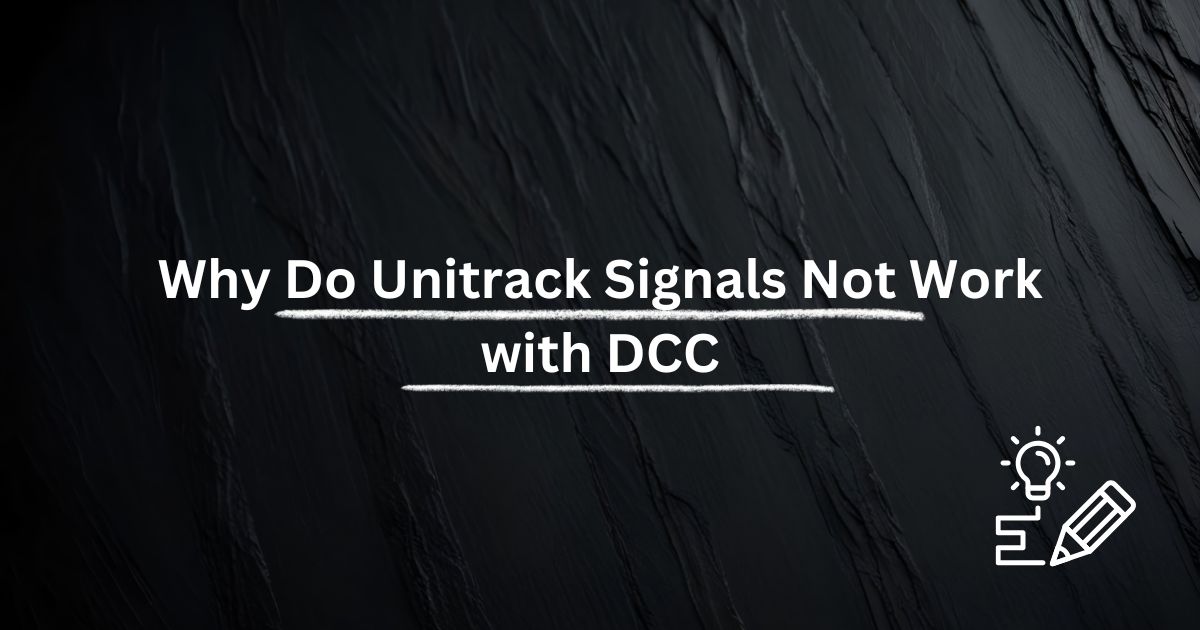Contents
The question “why do Unitrack signals not work with DCC” is one that model railroad enthusiasts often encounter. The incompatibility between these systems can cause confusion and frustration, especially for those new to digital model train control. This article dives into the technical and practical reasons behind this issue, offering insights and solutions to help you navigate this challenge.
What Are Unitrack Signals?
Unitrack signals are a staple of Kato’s Unitrack system, known for their simplicity and efficiency in analog setups. These signals provide realistic train control by responding to direct voltage changes, making them ideal for traditional layouts.
Understanding DCC Systems
Digital Command Control (DCC) systems bring advanced functionality to model railroading by allowing independent control of multiple trains on the same track. Unlike analog systems, DCC uses digital commands sent through the rails to manage train operations.
Why Do Unitrack Signals Not Work with DCC?
The core of the issue lies in the technological gap between Unitrack signals and DCC systems. Unitrack signals are built for analog environments, where electrical current controls signal behavior. On the other hand, DCC systems use digital packets of information, which are incompatible with the analog design of Unitrack signals.
Electrical Compatibility Issues
A significant reason why Unitrack signals do not work with DCC is the constant digital current on DCC tracks. Unitrack signals are not equipped to interpret these digital commands, leading to erratic or non-functional signaling.
Voltage and Current Mismatches
DCC systems typically operate at a higher voltage than analog systems. This can overwhelm the Unitrack signals, causing damage or malfunction. The question of “why do Unitrack signals not work with DCC” often boils down to these electrical mismatches.
Lack of Built-In Decoders
Unitrack signals lack the decoders needed to interpret DCC digital commands. Decoders are vital for translating digital signals into actionable instructions, and without them, Unitrack signals remain unresponsive in DCC setups.
The Analog Design of Unitrack Signals
Unitrack signals were specifically designed for analog systems, relying on simple voltage changes to trigger responses. This fundamental difference explains why Unitrack signals do not work with DCC systems without modifications.
Signal Powering Challenges
In analog setups, track voltage powers signals directly. However, the continuous digital signals in DCC disrupt this method, rendering Unitrack signals ineffective.
Interference from DCC Signals
High-frequency digital signals from DCC systems can interfere with the operation of Unitrack signals, leading to flickering lights or incorrect indications. This is another factor in why Unitrack signals do not work with DCC seamlessly.
Adapters and Their Role
Adapters can bridge the gap between these systems by converting DCC signals into an analog format that Unitrack signals can interpret. While not a perfect solution, adapters help mitigate some of the compatibility issues.
Challenges with Adapters
Using adapters is not without drawbacks. They can introduce delays and inaccuracies, making them a less-than-ideal solution for enthusiasts aiming for advanced automation.
Modifying Unitrack Signals
Custom modifications, such as adding decoders, are another way to address the issue of “why do Unitrack signals not work with DCC.” While effective, this requires technical expertise and can void warranties.
Future of Signal Systems in Model Railroading
As technology advances, manufacturers are likely to develop DCC-compatible Unitrack signals. This would eliminate the need for adapters or modifications, offering a more seamless experience for hobbyists.
Conclusion
So, why do Unitrack signals not work with DCC? The answer lies in their design and intended purpose. Unitrack signals are tailored for analog systems, while DCC systems operate on a digital platform. While solutions like adapters and modifications exist, they are not without limitations. As the hobby evolves, the gap between these systems may narrow, offering better integration options.
FAQs
1. Why do Unitrack signals not work with DCC systems out of the box?
Unitrack signals are designed for analog systems and cannot interpret the digital commands of DCC without modifications.
2. Can I use adapters to make Unitrack signals work with DCC?
Yes, adapters can help convert DCC signals into an analog format, but they may introduce some limitations.
3. Are there DCC-compatible signals available?
Yes, several manufacturers produce DCC-compatible signals that work seamlessly with digital systems.
4. What happens if I connect Unitrack signals directly to a DCC system?
Directly connecting Unitrack signals to a DCC system can cause malfunctions or damage due to electrical incompatibility.
5. Is modifying Unitrack signals a reliable solution?
While effective, modifications require technical expertise and may void the warranty of your Unitrack signals.











